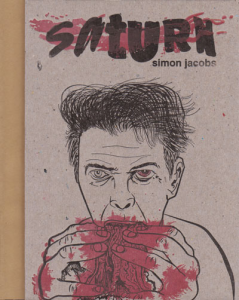Welcome to the Lightning Room, where DeWitt Brinson & Simon Jacobs take turns asking PANK authors extremely difficult questions about their work. Dolan Morgan’s story “Euclid’s Postulates” appeared in our April issue. Simon and Dolan talked about looking forwards, backwards, and down paths of no return. Dolan’s first book, That’s When the Knives Come Down, is forthcoming from Aforementioned Productions in August 2014.
***
1. “Euclid’s Postulates” is about, among many other things, the tenuous tracks of our lives compared against mathematical principles, and probably inevitability. Bearing this in mind, can you respond to this hypnotizing gif?
Yes, please, let’s talk about this hypnotizing gif. Now, for those who haven’t clicked through, I’ll save you the trouble: the gif includes a rotating green cube. Innocent enough. Familiar shape, calming tone, gentle rhythm. Great. But soon we see a new shape, interrupting our tranquility. A blue pentagon obscures part of the cube, immutable and irrevocable. Why? We can’t say. Then another, and another: blue pentagons definitively overtaking the cube like so many feral umbrellas – jesus, when will it stop? – until the cube itself is entirely subsumed, devoured and disappeared, such that we see clearly now, with a terrifying certainty, that a dodecahedron can be – and in fact has been, right here and now, you can’t deny it, it’s really happening – formed around this simple cube, and that it in fact was always there, waiting to be realized and made manifest. And of course, there is the inverse realization too: that beneath every dodecahedron has always been lurking this cube, mocking in its simplicity. The past is undone in an instant, one life swapped for another. David Foster Wallace has written of this particular kind of horror, wherein a person realizes that what scares us is not only here, but that it has been here all along, that even when we felt calm, safe, and secure, we had no grounds to feel this way. Take for example my sister’s one-time fiancé, Doug, who struggled to find employment. Fortunately, he landed a seasonal job working at a Christmas tree farm owned by a family friend, Eric. Every morning, Doug and Eric would head out in a truck through the trees, getting things ready for the holidays. Now, Eric noticed something peculiar each time they embarked, something that just couldn’t be ignored or denied, try as he might. So, one morning in the truck, Eric said, “Doug, I know you’re pooping.” Turns out, every time they got going, Doug would defecate in his pants, right there with Eric next to him, in the truck. Eric had hoped it wasn’t true, but day in and day out, the facts presented themselves, the irrefutable pentagons slowly formed on the situation, and Eric had to accept and confront it: “I know you’re pooping,” he said. Doug denied it. “No, I know you’re pooping. You’re doing it right now.” Doug again denied it, mid-movement. Eric gave him an ultimatum. “If you don’t admit what’s happening, I’ll have to fire you. You don’t even necessarily have to stop, you just have to admit it. Meet me halfway.” Doug did not. And I can only imagine Doug’s mortification – all that time he thought to himself that he was getting away with it. That no one knew he was pooping. He had a job. He had freedom. The brisk, early mornings. A hard day’s work. But he was wrong, and was forced to understand he’d always been wrong. These are the facts. Or take Gene Hackman: in Coppola’s The Conversation, he plays a surveillance expert who faces a moral quandary after discovering that the people he’s surveilling are targeted for murder – by none other than his own paying client. The people he spies on are concerned, sure, but ultimately unaware of the imminent danger, and it would be a breach of professional integrity for Hackman’s character to confirm their suspicions. Still, his silence makes him complicit. He jeopardizes his otherwise renowned career by finally attempting to intervene. Yet, at the crucial moment, he learns quite viscerally that he misinterpreted the conversation: the people he spied on were not concerned about being murdered, but in fact were plotting a murder. Mr. Hackman’s character must accept not only the horror of this current moment and the finality it entails, but must also contend with each prior moment he misconstrued. He too is being surveilled, has been all along. Everything has been reversed. His life is in shambles. It was never a cube, but always a dodecahedron. One thing becomes another, and in fact was never anything else in the first place. I know you’re pooping. At any moment, a single fact or series of facts, can present itself, such that whole swaths of our lives are swept away, people/places/things, to be replaced by something alien, something new. What we took comfort in up to now was never us at all, and this new alien thing, this unfamiliar thing: that has always been us. There’s no denying it. That’s why I am scared of this gif and will never look at it again. Continue reading →

![[PANK]](https://pankmagazine.com/wp-content/themes/pank/assets/images/pank-logo-large.png)
